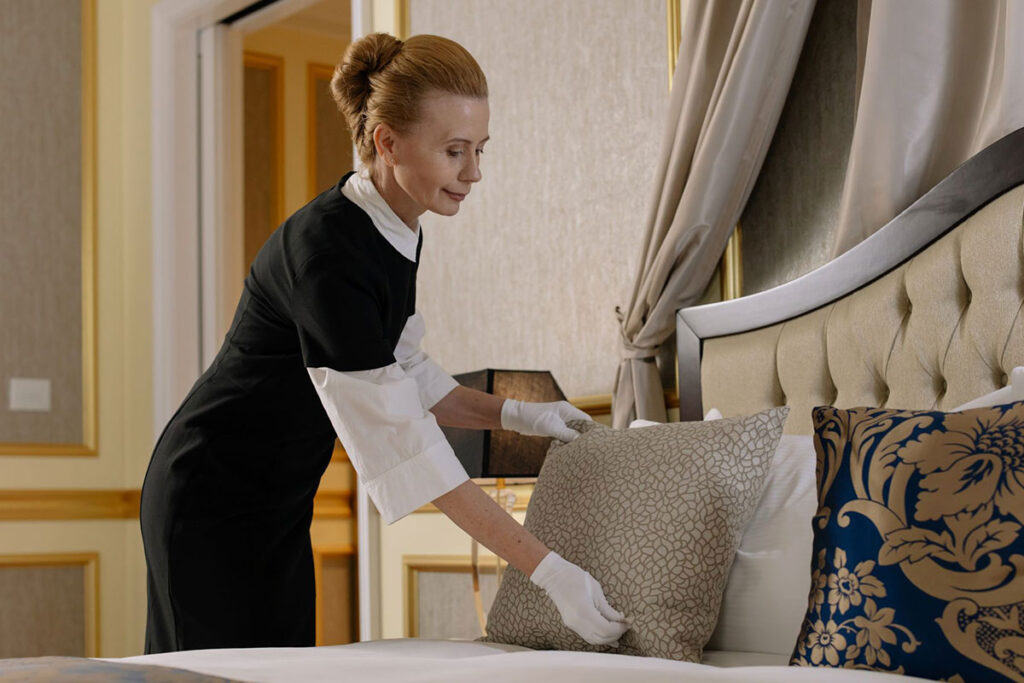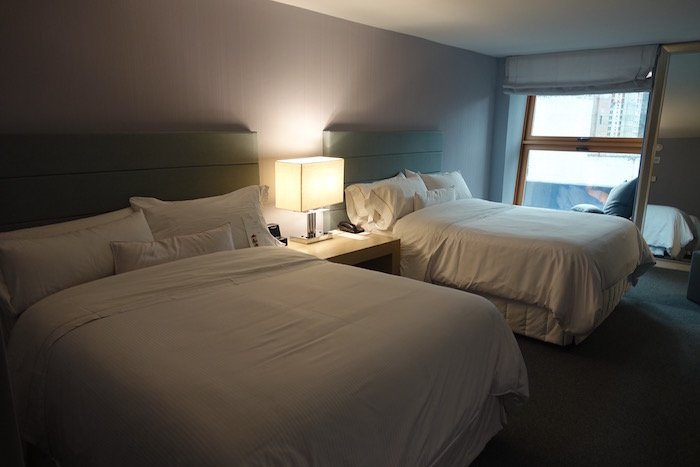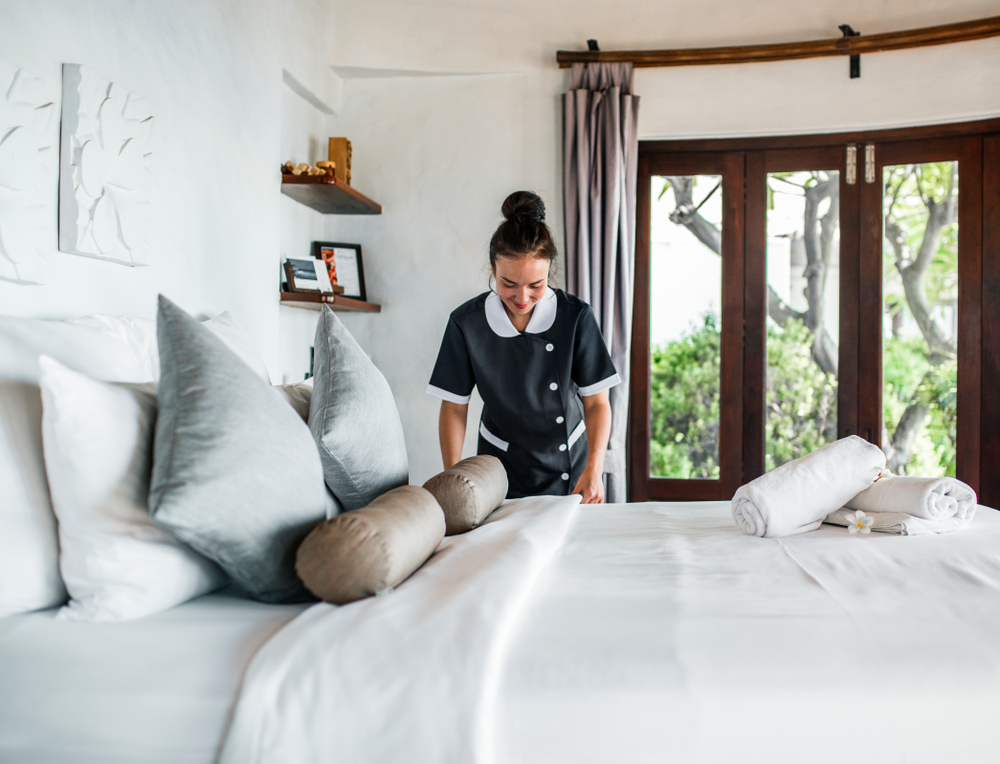Well, folks, we’ve all pondered this burning question at some point during our travels, haven’t we? I mean, nothing like lounging around in your favorite hotel robe while the housekeeping fairy tidies up your room, right? But alas, the eternal conundrum remains – can we, mere mortals, stay in the room while housekeeping works their magic? Fear not, my dear readers, for we shall delve into this pressing matter in the following paragraphs.
Now, we don’t want to leave you hanging in suspense, but we simply can’t spill all the beans just yet. Let’s just say that the answer to this perplexing question is more nuanced than one might think. There are factors to consider, my friends, such as the hotel’s policies, the specific tasks being performed by the housekeeping staff, and of course, common courtesy. We’ll explore all of these aspects in greater detail in the upcoming article. Trust us, you’re in for a wild ride filled with hotel etiquette, quirky anecdotes, and perhaps a dash of scandal. Stay tuned, dear readers, as we unravel the mystery of staying in the room while housekeeping.
Policies and Practices of Housekeeping
Importance of Housekeeping in Hospitality
Housekeeping is a crucial aspect of the hospitality industry. It goes far beyond simply tidying up a room. A clean and well-maintained environment is essential for creating a positive guest experience and ensuring their comfort and satisfaction. Housekeeping plays a key role in maintaining the reputation and standards of a hotel or any accommodation establishment.
Standard Operating Procedures for Housekeeping
To ensure consistency and efficiency, proper procedures and protocols are put in place for housekeeping tasks. This includes cleaning methods, inspection standards, and the use of appropriate cleaning agents and equipment. These standard operating procedures help maintain cleanliness, hygiene, and safety standards in all areas of the hotel, from guest rooms to common areas.
Guest and Employee Safety Measures
The safety and well-being of both guests and employees are of utmost importance. Housekeeping staff are trained to follow safety protocols and use personal protective equipment (PPE) to minimize the risk of accidents or injuries. Additionally, regular inspections and maintenance of equipment and facilities are conducted to identify and address any safety concerns.
Can You Stay in the Room While Housekeeping?
Now, the burning question: Can you stay in the room while housekeeping is being done? The answer, in most cases, is yes! As long as you communicate your preference for privacy, respect the housekeeping schedule, and follow certain guidelines, you can stay in the room while housekeeping carries out their duties.
Permissible Situations for Guests During Housekeeping
Guest’s Request for Privacy
If you prefer to have complete privacy during housekeeping, it is entirely acceptable to ask the housekeeping staff to return later. The staff will gladly honor your request. It’s your room, after all, and we understand the need for personal space and uninterrupted relaxation.
Tipping as a Consideration
If you choose to stay in the room during housekeeping, it is customary to tip the housekeeping staff as a gesture of appreciation for their work. Tipping is not obligatory, but it is a thoughtful way to recognize their efforts in ensuring your comfort and maintaining cleanliness.
Housekeeping Schedule and Guest Cooperation
To ensure smooth operations and timely cleaning, hotels typically follow a housekeeping schedule. It is essential for guests to cooperate by adhering to the given schedule. This includes vacating the room at specific times to allow the housekeeping staff to carry out their tasks efficiently. By doing so, you contribute to the overall cleanliness and comfort of the establishment.
Off-Peak and Peak Periods
During off-peak periods, when the hotel has fewer guests, it may be easier to accommodate guest requests to stay in the room while housekeeping. However, during peak periods, when there is a higher influx of guests, it may be more challenging to allow guests to stay in the room. Thus, it is important to understand and respect the constraints faced by the hotel during such busy periods.
Exceptions for Extended Stay Guests
For guests staying for an extended period, it is common for hotels to have arrangements in place that allow them to choose when housekeeping can be done. This flexibility caters to the individual’s preferences and schedule, making their stay more convenient and personalized.

This image is property of hotelchantelle.com.
Benefits of Allowing Guests to Stay during Housekeeping
Convenience and Flexibility for Guests
Allowing guests to stay in the room during housekeeping offers convenience and flexibility. It allows guests to continue with their activities without interruption or the need to vacate their room. Whether you’re working on an important project, catching up on your favorite TV show, or simply enjoying some relaxation time, staying in the room while housekeeping can be a convenient option.
Enhanced Guest Experience
By accommodating guests during housekeeping, hotels can enhance the overall guest experience. Guests feel more at ease and comfortable, as they can maintain their personal routines and activities without disruption. This leads to a more enjoyable and memorable stay, and guests are more likely to recommend the hotel to others.
Opportunity for Guest Feedback
Staying in the room during housekeeping provides guests with a unique opportunity to give immediate feedback to the housekeeping staff. This real-time communication allows for quick adjustments or rectifications if needed. It also fosters a sense of involvement and empowerment, as guests can actively contribute to the improvement of their stay.
Improved Communication and Trust
Allowing guests to stay in the room during housekeeping promotes open communication and builds trust between guests and staff. It creates a friendly and approachable atmosphere, where guests feel comfortable interacting with the housekeeping team. This positive rapport can lead to stronger guest relationships and increased satisfaction.
Challenges and Considerations for Allowing Guests to Stay
Increased Time and Efficiency Constraints
While allowing guests to stay in the room during housekeeping is advantageous, it can also pose challenges in terms of time management and efficiency. Housekeeping tasks may take longer if the staff needs to work around guests, potentially affecting the overall productivity of the team. To address this, clear guidelines and training are essential to ensure that housekeeping duties are completed within reasonable timeframes.
Disruption of Housekeeping Workflow
Staying in the room during housekeeping may disrupt the usual workflow of the housekeeping staff. They may need to adjust their cleaning methods, rearrange their tasks, or take extra precautions to ensure guest comfort and safety. These adjustments can strain the efficiency and effectiveness of the overall housekeeping process.
Safety and Liability Concerns
Allowing guests to stay in the room during housekeeping raises safety and liability concerns. The presence of guests may distract the housekeeping staff, potentially increasing the risk of accidents or injuries. To mitigate these risks, proper training and equipment, along with clear communication between staff and guests, are crucial.
Privacy Issues
Privacy is a central concern when allowing guests to stay in the room during housekeeping. The housekeeping staff must respect the privacy of the guests at all times. They should avoid touching personal belongings unless necessary for the task at hand. Likewise, guests should take appropriate measures to ensure the security of their valuables and personal belongings.

This image is property of cdn.onemileatatime.com.
Alternative Solutions to Accommodate Guests
Offering Housekeeping Time Options
To cater to the preferences of guests, hotels can consider offering housekeeping time options. This allows guests to select a convenient time slot for housekeeping that aligns with their activities and schedule. By providing flexibility, hotels can balance guest comfort with operational efficiency.
Providing Guest Lounge or Common Area
Hotels can create dedicated guest lounge areas or common spaces where guests can relax or engage in activities while housekeeping is being done in their room. This arrangement provides guests with an alternative space to retreat to, ensuring their comfort and convenience.
Advance Housekeeping Requests
To minimize any inconvenience, guests can make advance housekeeping requests, specifying their preferred time slots or any particular instructions or preferences. This allows the housekeeping staff to plan their tasks accordingly and ensures that guests can continue with their activities uninterrupted.
Utilizing Do-Not-Disturb Signs
Hotels can implement a system where guests can indicate their preference to stay in the room during housekeeping by using do-not-disturb signs. By respecting these signs, housekeeping staff can efficiently manage their tasks while honoring guest privacy and requests.
Housekeeping Information and Guidelines for Guests
Hotels can provide guests with comprehensive housekeeping information and guidelines. This can include details on the housekeeping schedule, how to request privacy, tips for a harmonious experience, and instructions on securing valuables and personal belongings. Clear communication and transparency help guests understand what to expect and how they can best navigate housekeeping arrangements.
Best Practices for Harmonious Housekeeping Experience
Clear Communication and Expectations
Effective communication between guests and housekeeping staff is vital for a harmonious housekeeping experience. Guests should clearly communicate their preferences and expectations, while housekeeping staff should proactively seek guest input and provide necessary information. This ensures that both parties are on the same page and can work together towards a satisfactory outcome.
Coordination with Front Desk and Management
Smooth coordination between the front desk, management, and housekeeping staff is crucial for a seamless housekeeping experience. Regular communication and updates facilitate efficient scheduling and task management. It also allows for timely resolution of any issues or concerns that may arise during the housekeeping process.
Respecting Guest’s Privacy
Respecting guest privacy is paramount during housekeeping. Housekeeping staff should minimize disruption, avoid unnecessary contact with personal belongings, and always knock and announce their presence before entering a room. Guests, on the other hand, should be mindful of their own privacy by securing their valuables and personal items.
Efficient Cleaning Techniques
Housekeeping staff should employ efficient cleaning techniques to ensure that tasks are completed effectively and within reasonable timeframes. Proper training and utilization of cleaning tools and equipment can contribute to increased productivity and better overall results.
Professionalism and Friendly Service
Maintaining a high level of professionalism and providing friendly service are essential components of a positive housekeeping experience. Housekeeping staff should be courteous, approachable, and attentive to guest needs. A warm smile and a friendly gesture can go a long way in making guests feel welcome and valued.
This image is property of i.insider.com.
Guest Etiquette and Behaviors during Housekeeping
Securing Valuables and Personal Belongings
Guests should take appropriate measures to secure their valuables and personal belongings during housekeeping. This includes using in-room safes or lockers provided by the hotel. By doing so, guests can have peace of mind knowing that their belongings are safe, even when staying in the room during housekeeping.
Maintaining a Respectful Distance
While it is acceptable to stay in the room during housekeeping, guests should maintain a respectful distance from the housekeeping staff. This allows them to carry out their duties efficiently and without hindrance. It is always good practice to step aside or occupy a different space within the room to give the staff ample room to work.
Avoiding Interference and Distractions
Guests should avoid interfering with the housekeeping process or causing distractions. This includes refraining from engaging in loud activities, blocking access to areas that need cleaning, or diverting the attention of the housekeeping staff. By being considerate, guests facilitate a smooth and efficient housekeeping experience for everyone involved.
Providing Access and Cooperation
To ensure a thorough cleaning, guests should provide access to all areas of the room. This means removing personal items from surfaces that need cleaning, such as beds or countertops. Cooperation with the housekeeping staff by following their instructions or requests can greatly contribute to a positive housekeeping experience.
Signs Indicating When Guests Should Leave the Room
Safety and Security Measures
There are certain situations where guests should leave the room for their own safety and security. These include instances where the housekeeping staff needs to access electrical panels, work on plumbing fixtures, or utilize heavy machinery. In these cases, it is essential for guests to vacate the room to prevent any accidents or injuries.
Usage of Hazardous Chemicals
Housekeeping staff sometimes need to use hazardous chemicals for certain cleaning tasks. When these chemicals are being used, guests should leave the room to avoid exposure to potentially harmful substances. It is a precautionary measure to ensure the well-being of guests and maintain a safe environment.
Specific Housekeeping Tasks
Certain housekeeping tasks may require guests to briefly leave the room. This can include changing bed linens, deep cleaning certain areas, or addressing maintenance issues. Proper notification from the housekeeping staff will be given, allowing guests to step out temporarily until the task is completed.
Property Policies and Rules
Guests should familiarize themselves with the property policies and rules, which may determine whether they should stay in the room or vacate during housekeeping. Some hotels may have specific guidelines in place due to safety or operational considerations. It is important to respect and adhere to these policies for a harmonious housekeeping experience.

This image is property of arc-anglerfish-washpost-prod-washpost.s3.amazonaws.com.
Tips for a Positive Guest and Housekeeping Interaction
Expressing Appreciation and Gratitude
A positive attitude and expression of appreciation can go a long way in making the housekeeping experience enjoyable for both guests and staff. A simple “thank you” or a note of appreciation left for the housekeeping team can make their day and motivate them to continue providing excellent service.
Open Communication and Feedback
Open communication and feedback are essential for continuous improvement. Guests should feel comfortable sharing any concerns or suggestions with the housekeeping staff or the hotel management. Likewise, housekeeping staff can also seek guest feedback to understand their preferences and areas for improvement.
Friendly Gestures and Smiling
A friendly gesture, such as making conversation or offering a smile, can help create a positive atmosphere during housekeeping. It humanizes the interaction and fosters a sense of connection between guests and housekeeping staff. A friendly exchange can make the housekeeping experience more pleasant and enjoyable for all parties involved.
Understanding Each Other’s Perspective
Both guests and housekeeping staff should try to understand and appreciate each other’s perspective. Guests may have certain expectations or preferences, while housekeeping staff may face constraints or challenges in providing their services. By recognizing the efforts and limitations of both sides, a more harmonious and understanding relationship can be fostered.
Conclusion
Can you stay in the room while housekeeping? The answer is yes, with a few considerations. Guest privacy and comfort are integral to the housekeeping experience, and hotels strive to accommodate guest preferences whenever possible. By communicating your needs, respecting guidelines, and offering mutual respect and understanding, you can enjoy the convenience and flexibility of staying in the room during housekeeping. Remember, the ultimate goal of housekeeping is guest satisfaction, and by balancing privacy and operational efficiency, hotels can create an exceptional experience for their guests.

This image is property of firstquarterfinance.com.

